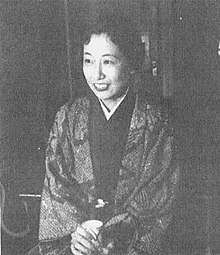Natto Wada
Natto Wada (和田 夏十, Wada Natto, 13 September 1920 – 18 February 1983),[1] also known as Natsuto Wada, was a Japanese script writer and film columnist.[2]
Natto Wada | |
|---|---|
 Wada in 1954 | |
| Born | 13 September 1920 |
| Died | 18 February 1983 |
Career
Wada graduated with an English degree from Tokyo Women's College in 1946.[3] She started her career at the Fujimoto Cinema Production company, where she met her husband, Kon Ichikawa, a filmmaker who promoted her script work to colleagues and collaborated with her on several films.[3] She began writing, or co-writing, scripts in 1951, and continued until 1965.[3]
Films
Wada's scripts included the 1953 film Puu-san, a satirical comedy based on the manga of Yokoyama Taizo; the 1956 film Shokei no Heya, based on a novel by Ishihara Shintaro.[3] That year, Wada also wrote Nihonbashi, based on a novel by Izumi Kyoka, which documented the rivalry of two geisha in a male-dominated culture. Kuroi Junin no Onna (Ten Dark Women) was a 1961 film that satirized an egotistical male's reliance on his wife to stay out of trouble.[3] Also that year, Wada wrote Hakai (The Broken Commandment) a film adaptation of Shimizaki Toson's eponymous 1906 novel, which examined the life of a social outcast. Wada's adaptation was notable for strengthening the role of the female protagonist.[3]
Other film scripts from Wada or with collaborators include Biruma no Tategoto (Harp of Burma, 1956), based on the eponymous 1946 novel by Takayama Michio; Enjō (Conflagration, 1959) based on Mishima Yukio's 1956 novel, The Temple of the Golden Pavilion.[3]
Columnist
Wada was also known for her work as an advice columnist during the 1960s. Her column, "Personal Life Consultation," ran in the Asahi Shimbun.[3]
References
- Nelmes, Jill; Selbo, Jule. Women Screenwriters: An International Guide. Springer. p. 114. ISBN 978-1-137-31237-2.
- Wispelwey, compiled by Bearbeitet von Berend (2004). Japanese biographical index = Japanischer Biographischer Index. Walter de Gruyter. p. 996. ISBN 3-11-094798-6.
- Mulhern, ed. by Chieko I. (1994). Japanese women writers : a bio-critical sourcebook (1. publ. ed.). Westport, Conn. u.a.: Greenwood Press. pp. 448–450. ISBN 0-313-25486-9.CS1 maint: extra text: authors list (link)
External links
- Natto Wada on IMDb